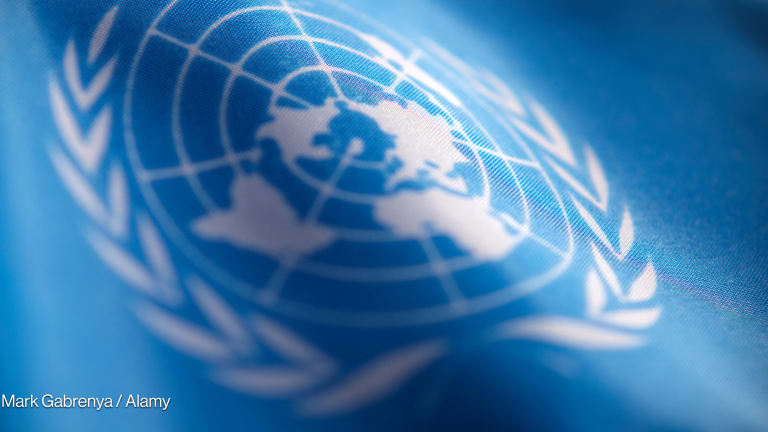Nigeria Humanitarian Fund aims to streamline emergency funding distribution

ABIDJAN — Administrators of the recently-inaugurated Nigeria Humanitarian Fund say it is beginning to bring quick relief to Nigeria’s northeast region, which is facing a displacement crisis and near-famine conditions in the wake of violence and conflict by Islamist militants Boko Haram.
NHF combines the contributions of private and public donors into a country-based pooled fund managed by the United Nations Office for the Coordination of Humanitarian Affairs. The fund’s administrators say it will deliver timely support to frontline responders to conduct priority activities, such as life-saving health services, protection enhancements and water and sanitation improvements.
“Since the allocations are done in-country, we can appropriately meet the needs on the ground, [and] target money to priorities as they evolve,” Edward Kallon, the resident and humanitarian coordinator in Nigeria, told Devex. “Since [disbursement] is done by the humanitarian community, there is more effective coordination and also precise allocation of resources targeting the most needy,” he said.
Since its inception in February 2017, the fund has garnered more than $25 million in international funding — including donations of $11.9 million from Sweden, $5.4 million from Germany and roughly $2.3 million from Ireland. To request financial assistance, aid workers on the ground identify the most pressing humanitarian intervention needs and prioritize the most urgent activities. Organizations — such as international, national and local NGOs, U.N. agencies and Red Cross/Red Crescent Societies — can then request funding through the humanitarian coordinator and based on the advice of aid workers and current needs assessments, the humanitarian coordinator allocates the pooled funding.
See more related topics:
► Hepatitis E outbreak sparks concern in Lake Chad Basin
► Opinion: Don't let reconstruction in Nigeria become a cliché
► The UN is pushing for a dual-track response to the food insecurity crises. Is this feasible?
Previously, funds in emergency contexts were paid out via bilateral funding or a central emergency response fund. Since 2016, 18 country-based pooled funds like this one have been launched globally to ensure that limited humanitarian funding reaches the most vulnerable based on the premise that funding would be coordinated by those at the local level closest to the populations in need.
The initial $10.5 million allocation will finance life-saving services and recovery operations in the country’s northeast over the next few months. Kallon said immediate funding will support reproductive health improvements; maternal, newborn and child health in crisis-affected communities; and WASH projects designed to address water and sanitation concerns for displaced and host communities.
A recent outbreak of hepatitis E virus, an infection usually spread by fecally-contaminated water, has also raised concerns about the unsafe water conditions in the Lake Chad Basin. In response, some funding will be reserved for preventative health measures and crisis management.
According to U.N. figures, some 8.5 million people need urgent assistance in the worst-hit areas among Nigeria’s Borno, Adamawa and Yobe states, including 450,000 malnourished children. This year, more than 70 humanitarian organizations plan to assist roughly 7 million people with nutrition, food, shelter, health, education, protection and water and sanitation relief, many through NHF funding.
Nigeria is currently the world’s fourth largest single-country appeal. However, to date, the U.N. says it has just 43 percent of the $1.05 billion it needs to address the crisis.
Access to affected areas remains a challenge, but Kallon said aid groups are working closely with ministries and government officials to reach remote populations. “We are also working on establishing humanitarian hubs that provide safe areas for the U.N. and NGOs to increase outreach to the affected areas,” he told Devex.
These hubs will include offices and warehouses to store supplies such as food and household items for distribution, and allow aid workers to reach populations quicker with life-saving services, medical support and shelter provisions, for example.
However, Kallon argued that the root causes of the crisis must be addressed to ensure long-term stability. Development failures, minimal governance, poverty and other vulnerabilities require long-term interventions that the fund cannot address with short-term funding.
“We are dealing with a short-term intervention but also a longer-term intervention to address the root cause of the crisis,” he said. “Although we have been able to scale up the response, essentially we have not turned the corner yet, given the scale and scope of the crisis.”
Read more international development news online, and subscribe to The Development Newswire to receive the latest from the world’s leading donors and decision-makers — emailed to you free every business day.
Search for articles
Most Read
- 1
- 2
- 3
- 4
- 5








